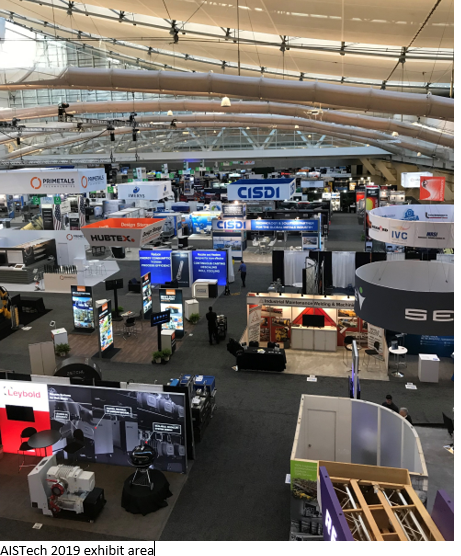Market Segment

May 17, 2022
AISTech 2022: Execs Say Strict Trade Laws Key to Greener Steel
Written by David Schollaert
Strict and strictly enforced trade laws are key to backing the steel industry’s investments in decarbonization.
That was the takeaway from a press conference on Tuesday, May 17, at the AISTech 2022 conference in Pittsburgh.
Executives from Steel Dynamics Inc. (SDI), Commercial Metals Co. (CMC), the Steel Manufacturers Association (SMA), and the American Iron and Steel Institute (AISI) didn’t pull any punches in making their case.
“Any product that is manufactured in the United States should be using US-made steel,” CMC president and CEO Barbara Smith said. “It is the greenest, cleanest, and frankly the lowest cost.”
The domestic steel industry is the lowest CO2 emitter in the world, and yet it must continually address “distortions that other countries use that make it difficult for us,” she said.
SDI president and CEO Mark Millett agreed that the US steel industry was the cleanest in the world, highlighting the country’s predominantly – and expanding – electric-arc furnace (EAF) footprint. “The electric-arc furnace segment of the US industry is absolutely, by far the cleanest in the world.”
Trade measures are one way to protect the domestic industry, SMA president Philip Bell said. He was asked if he supported a fee or tax on carbon-intensive products imported into the US.
“Yes. But any policy we pursue should be one that does not disadvantage American steelmakers or American manufacturers. (Because) we have the lowest carbon intensity steel made in the world,” he said.
Bell backed up that assertion with data from the Climate Leadership Council and CRU Group’s Sustainability and Emissions Analysis Tool.
“Anything that helps to make dirty steel pay a premium to have the right to be sold in the United States is worthwhile in our opinion,” he said.
AISI president and CEO Kevin Dempsey said the US must also continue to update and strengthen anti-dumping and countervailing law.
“One of the threats to that progress is if there remains an incentive to dump cheap but much dirtier steel from abroad. That could undermine the advances that the US industry is making,” Dempsey said.
He also supported supplementing AD/CVD laws with carbon-based mechanisms. “One of the policy options that should be considered by Congress is the development of a carbon border adjustment mechanism (CBAM) on imported steel. That would level the playing field.”
Take the Leveling the Playing Field Act 2.0, an Amendment to the Endless Frontier Act introduced by Senators Rob Portman (R-Ohio) and Sherrod Brown (D-Ohio). Dempsey said that would improve and strengthen US trade laws.
“Many governments from around the world continue to fully subsidize their industries, and there’s still a great deal of dumping going on in the US,” Dempsey said. “So maintaining strong trade laws is our ultimate line of defense against unfair trade in our industry.”
Bell said that in addition to maintaining strong trade laws, the US government needs to ensure that the $1.2 trillion infrastructure package that was passed last year “has strong domestic procurement preferences.” For that to be successful, he said “we have to have steel that’s made by Americans for Americans.”
And “Buy America” is also a simple mechanism for making the American economy greener because “when you are buying steel that is made here, you are buying steel that is made with the lowest carbon intensity in the world,” he said.
Millett said the responsibility for a greener environment does not just fall on the shoulders of the American steel industry but on the American consumer as well.
“The American consumer needs to recognize that the biggest impact (they) can have on global warming is buying American,” he said. He pointed toward not only direct steel imports to the US but also the 32-33 million tons of steel-containing products that arrive at US ports.
“We’re talking autos, appliances, and more… of which the vast majority of that is made from Chinese steel,” Millett said. “China generates 15% of the global CO2 emission. Having people understand that is critical.”
As for the US industry, Bell said that too much negative light has been cast on capacity expansions, as if newer, more efficient and less polluting mills were a bad thing. We should instead cheer domestic steel’s drive toward modernization, electrification, and decarbonization, he said. “It’s not just tons coming online, it’s making our steel industry more competitive and more efficient.”
About AISTech 2022
AISTech 2022, presented by the Association for Iron & Steel Technology, hosted nearly 8,000 attendees this year. The four-day conference runs from May 16-19 in Pittsburgh and includes more than 300 technical presentations as well as more than 500 domestic and international exhibitors. The exhibit floor was a dizzying display of the latest innovations from software and robotics to cranes and steel mill planning. Student exhibits, technical presentations, and panel discussions highlighted new equipment and processes that will drive the industry’s future.
By David Schollaert, David@SteelMarketUpdate.com








